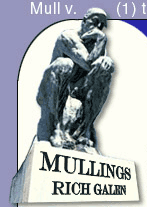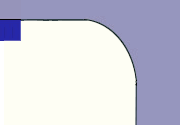|
|

|


Rooting for Recession?
Rich Galen
Thursday August 22, 2019
 Twitter Twitter
Click here for an Easy Print Version
Getting Mullings forwarded to you by a friend? You can get your own copy of Mullings delivered by just clicking here to SIGN UP FOR MULLINGS.
You'll be on the mailing list in time for the next edition.
-----
- A recession is generally defined as two successive quarters of negative growth in the Gross Domestic Product (GDP).
- Are Democrats rooting for a recession? Should they be?
- According to an article in Forbes,
Citigroup, in a new report, points out that there has been a tendency for Republican presidents to be elected close to business cycle peaks and Democrats more often come in when the economy is depressed and set to recover.
- Neither of those circumstances appear to be in the offing for next year: A business cycle coming off its highs and headed downward.
- A political aphorism holds that what voters perceive to be going on in the economy in July and August of the election year is what they take into the polling booths with them.
- Indeed, in a May 1992 article, the New York Times noted:
"Whenever the economy has grown in the six to nine months before an election, voters historically have tended to ignore earlier economic worries and focus on the recent good news."
- Most of us remember (or have heard enough times) the famous James Carville chant from the 1992 election (George H.W. Bush vs Bill Clinton) "It's the economy stupid."
- The Republican incumbent lost.
- Although, according to Berkely.edu, "The recession of the early 1990s lasted from July 1990 to March 1991," the recovery was slow enough so that Carville, et al. could - even in the pre-TFG (Twitter, Facebook, Google) era - convince Americans they were still suffering.
- In the Spring of 1980 (Jimmy Carter vs Ronald Reagan) unemployment spiked to 7.5 percent and inflation rose to 13.5 percent. The Federal Reserve was faced with trying to deal with both a sagging economy and high inflation which helped lead to the election of Ronald Reagan that Fall.
- The Democratic incumbent lost.
- In 1996 (Bill Clinton vs Bob Dole), fueled by the dot-com bubble, the United States was still in the midst of the recovery that that had begun five years earlier. Unemployment for the year was 5.4 percent - the lowest it had been since 1989. The nation's GDP was growing at a healthy rate of 4.2 percent in the 4th quarter.
- The Democratic incumbent won.
- In the election of 2004 (George W. Bush vs John Kerry), unemployment had dropped from 6.3 percent in 2003 to 5.4 percent in the election year. GDP was at 3.8 percent (up from 2.9 percent the previous year.
- The economy was not exactly booming for Bush's re-election, but it was clearly on the rebound.
- The Republican incumbent won.
- In July of 2012 (Barack Obama vs Mitt Romney) unemployment was high - about 8.2 percent, but that was down from Obama's first year when it peaked at at about 10 percent.
- The economy was still struggling to climb out of the recession that had begun in the Winter of 2007. Although GDP grew at a tepid half percent in both Q3 and Q4 of 2012, the key word - after all of the economic turmoil of the previous four years - was "grew."
- The Democratic Incumbent won.
- That brings us to the election of 2020.
- If the previous 50-or-so years is prologue, the economy over the next 10-12 months will help determine the future of the Trump Presidency.
- The business about a week ago when the mysterious phrase "Inverted Yield Curve" suddenly led the discussion around the Keurig machine in office kitchens around America, has led to a steady drumbeat about the potential of a coming recession.
- The current estimate of GDP growth is about 2.1 percent - down a full percentage point from the previous quarter. That growth rate, lackadaisical as it seems, is not far off the average of 2.56 percent annual growth in the nine years since the end of the 2007 recession.
- It is clear that an economic downtown is often fatal to a President's chances of re-election.
- Democrats - while huddled in dark corners and plotting legislative skullduggery - better not get caught rooting for a recession - with the unemployment, and overall economic hardships that would visit on voters.
- It's an economic balancing act neither side is very good at.
- On the Secret Decoder Ring Page today: The 1992 pre-election article from the New York Times, the recession of 2007, and an explanation of the dreaded Inverted Yield Curve.
The Mullfoto is one in a long series of my cat, of whom I am very jealous.
-- END --
Copyright © 2019 Barrington Worldwide, LLC.
All Rights Reserved
Become a
Paid Mullings Subscriber!
Current Issue |
Secret Decoder
Ring | Past
Issues | Email
Rich | Rich
Who?
Copyright ©2013 Barrington Worldwide, LLC | Site design by Campaign
Solutions. | |
|



